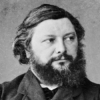Gustave Courbet

Gustave Courbet
Jean Désiré Gustave Courbetwas a French painter who led the Realist movement in 19th-century French painting. Committed to painting only what he could see, he rejected academic convention and the Romanticism of the previous generation of visual artists. His independence set an example that was important to later artists, such as the Impressionists and the Cubists. Courbet occupies an important place in 19th-century French painting as an innovator and as an artist willing to make bold social statements through his...
NationalityFrench
ProfessionPainter
Date of Birth10 June 1819
CityOrnans, France
CountryFrance
Painting is the representation of visible forms. . . The essence of realism is its negation of the ideal.
When we see men of worth, we should think of equalling them; when we see men of a contrary character, we should turn inward and examine ourselves.
I deny that art can be taught, or, in other words, maintain that art is completely individual, and that the talent of each artist is but the result of his own inspiration and his own study of past tradition.
I hope always to earn my living by my art without having ever deviated by even a hair's breadth from my principles... to please anyone or to sell more easily.
Art is a wholly physical language whose words are all the visible objects.
Titles have never given a just idea of things; were it otherwise, the work would be superfluous.
Without trying to clear up the degree of correctness of a qualification which no one, one must hope, will be asked to understand exactly, I will limit myself to a few words of explanation to cut short any misunderstandings.
I am not one who was born in the custody of wisdom; I am one who is fond of olden times and intense in quest of the sacred knowing of the ancients.
The beautiful is in nature, and it is encountered under the most diverse forms of reality. Once it is found it belongs to art, or rather to the artist who discovers it.
I have never seen an angel. Show me an angel, and I'll paint one.
I too am a government.
I have studied the art of the masters and the art of the moderns, avoiding any preconceived system and without prejudice. I have no more wanted to imitate the former than to copy the latter; nor have I thought of achieving the idle aim of art for art's sake.
The state is not competent in artistic matters... When the state leaves us free, it will have carried out its duty.
When I am dead, let it be said of me: he belonged to no school, to no church, to no institution, to no academy, and least of all, to any regime except the regime of liberty.